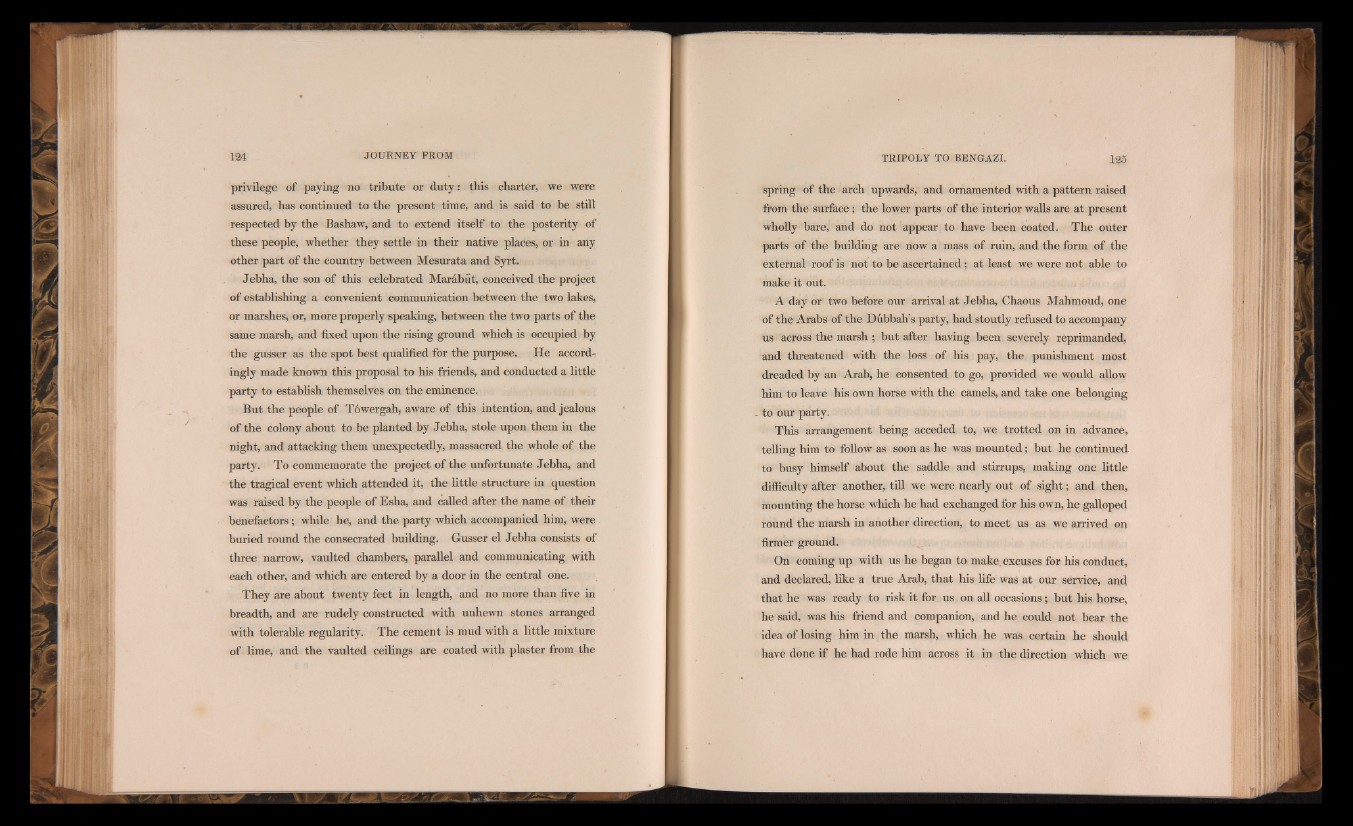
privilege of paying no tribute or duty: this charter, we were
assured, has continued to the present time, and is said to be still
respected by the Bashaw, and to extend itself to the posterity of
these people, whether they settle in their native places, or in any
other part of the country between Mesurata and Syrt.
Jebha, the son of this celebrated Mar&but, conceived the project
of establishing a convenient communication between the two lakes,
or marshes, or, more properly speaking, between the two parts of the
same marsh, and fixed upon the rising ground which is occupied by
the gusser as the spot best qualified for the purpose. He accordingly
made known this proposal to his friends, and conducted a little
party to establish themselves on the eminence.
But the people of T6wergah, aware of this intention, and jealous
of the colony about to be planted by Jebha, stole upon them in the
night, and attacking them unexpectedly, massacred the whole of the
party. To commemorate the project of the unfortunate Jebha, and
the tragical event which attended it, the little structure in question
was raised by the people of Esha, and called after the name of their
benefactors; while he, and the party which accompanied him, were
buried round the consecrated building. Gusser el Jebha consists of
three narrow, vaulted chambers, parallel and communicating with
each other, and which are entered by a door in the central one.
They are about twenty feet in length, and no more than five in
breadth, and are rudely constructed with unhewn stones arranged
with tolerable regularity. The cement is mud with a little mixture
of lime, and the vaulted ceilings are coated with plaster from the
spring of the arch upwards, and ornamented with a pattern raised
from the surface; the lower parts of the interior walls are at present
wholly bare, and do not appear to have been coated. The outer
parts of the building are now a mass of ruin, and the form of the
external roof is not to be ascertained; at least we were not able to
make it out.
A day or two before our arrival at Jebha, Chaous Mahmoud, one
of the Arabs of the Diibbah’s party, had stoutly refused to accompany
us across the marsh ; but after having been severely reprimanded,
and threatened with the loss of his pay, the punishment most
dreaded by an Arab, he consented to go, provided we wpuld allow
him to leave his own horse with the camels, and take one belonging
to our party.
This arrangement being acceded to, we trotted on in advance,
telling him to follow as soon as he was mounted; but he continued
to busy himself about the saddle and stirrups, making one little
difficulty after another, till we were nearly out of sight; and then,
mounting the horse which he had exchanged for his own, he galloped
round the marsh in another direction, to meet us as we arrived on
firmer ground.
On coming up with us he began to make, excuses for his conduct,
and declared, like a true Arab, that his life was at our service, and
that he was ready to risk it for us on all occasions; but his horse,
he said, was his friend and companion, and he could not bear the
idea of losing him in the marsh, which he was certain he should
have done if he had rode him across it in the direction which we